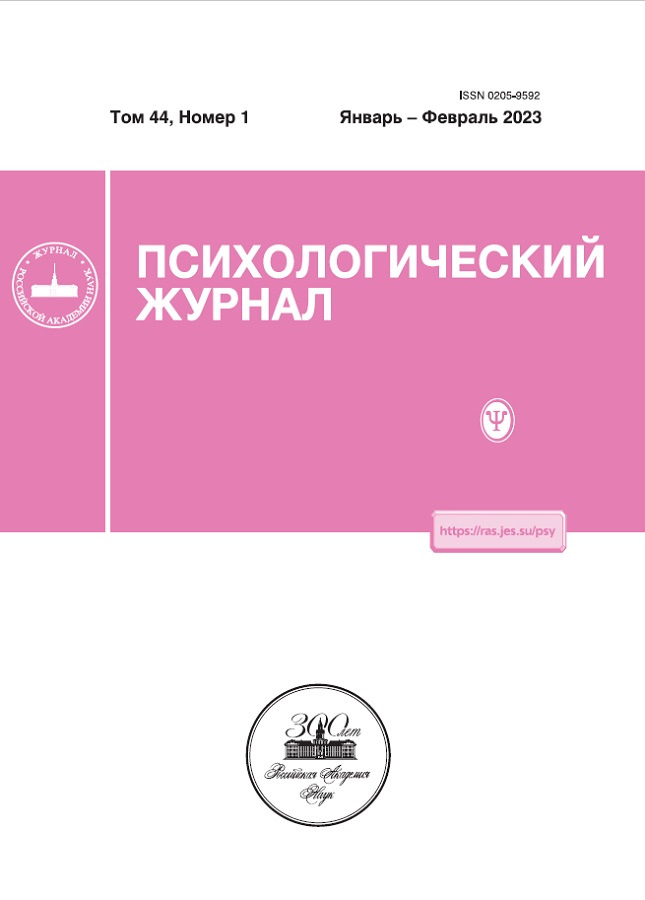Social Media Discourse: Intensional Approach
- 作者: Pavlova N.D.1, Afinogenova V.A.1, Grebenshchikova T.A.1
-
隶属关系:
- Institute of Psychology, Russian Academy of Sciences
- 期: 卷 44, 编号 1 (2023)
- 页面: 81-90
- 栏目: Psychology and the internet
- URL: https://rjmseer.com/0205-9592/article/view/661054
- DOI: https://doi.org/10.31857/S020595920024354-5
- ID: 661054
如何引用文章
详细
Social media is a new reality of modern society and represent as a platform of online communication of millions of people. During the discussion reflection of current events is happening, positions of communication’s subjects on topical issues are forming and changing, impact is made. Definition of intentional characteristics of network discourse related to motivational, perceptual-cognitive processes, communicants’ practical activity becomes particularly relevant in this regard. The approach realized in this study is aimed at characterizing the intentional space of social media discourse and identifying discursive markers of Internet users’ actual intentions, suitable for their objective evaluation. 46 messages of various topics and their discussion (1835 comments) on various network resources in 2015–2022 are served as the material for our study. Intent-analysis is used to assess psychological content of speech. This method allows to determine communicators’ intentions associated with current interaction and communicative tactics. 51 categories of intentions are described (4947 realizations). High intensity negative intentions dominate among them regardless of their topics that points to pronounced negative evaluability and potential conflictuality. In addition, social media discourse has clear informational focus due to extensive representation of neutral intentions associated with exchange of opinions, analysis and discussion of the situation. Context specific markers of communicators’ intentions: lexical, semantic, graphic and punctuation are found in it. Some markers are specific to certain intentions; others are realized in actualization of a number of intentions that associated with the variety of expression ways and words’ multiple meanings.
全文:
作者简介
N. Pavlova
Institute of Psychology, Russian Academy of Sciences
Email: psy.journ@yandex.ru
head of Laboratory of speech psychology and psycholinguistics Institute of Psychology RAS
俄罗斯联邦, MoscowV. Afinogenova
Institute of Psychology, Russian Academy of Sciences
Email: psy.journ@yandex.ru
PhD, Research Scientist
俄罗斯联邦, MoscowT. Grebenshchikova
Institute of Psychology, Russian Academy of Sciences
编辑信件的主要联系方式.
Email: psy.journ@yandex.ru
research scientist
俄罗斯联邦, Moscow参考
- Batura T.V., Korb A.V., Pechyonkina A.M. Analiz illokutivnyh funkcij vyskazyvanij na primere tekstovyh soobshchenij v Tvittere. Sibirskij psihologicheskij zhurnal. 2015. № 58. P. 162–174. (In Russian)
- Diskurs v sovremennom mire. Psihologicheskie issledovaniya. Eds. N.D. Pavlova, I.A. Zachesova. Moscow: Izd-vo “Institut psihologii RAN”, 2011. 368 p. (In Russian)
- Zhuravlev A.L., Kitova D.A. Analiz interesa naseleniya k informacii o pandemii koronavirusa (na primere pol'zovatelej poiskovyh sistem interneta). Psikhologicheskii zhurnal. 2020. V. 41. № 4. P. 5–18. (In Russian)
- Kirilina A.V. Gender i gendernaya lingvistika na rubezhe tret'ego tysyacheletiya. Voprosy psiholingvistiki. 2021. V. 49. № 3. P. 109–148. (In Russian)
- Kulikova V.A. Novoobrazovaniya kak sredstvo verbal'noj agressii v tekstah internet-SMI. Russkij yazyk v internet-kommunikacii: lingvokognitivnyj i pragmaticheskij aspekty. Ed. L.V. Raciburskaya. M.: Flinta, 2021. P. 284–317. (In Russian)
- Labutina V.V., Topchij I.V. Oppoziciya “my” — “oni” v diskursivnoj praktike kommentariya setevogo mediakontenta. Vestnik VGU. Seriya: Filologiya. Zhurnalistika. 2020. № 1. P. 100–106. (In Russian)
- Moshtyleva E.S. Modeli narracii v sovremennoj russkoyazychnoj internet-kommunikacii: lingvopragmaticheskij i lingvostilisticheskij analiz. Dissertaciya na soiskanie uchenoj stepeni kandidata filologicheskih nauk. Nijniy Novgorod, 2021. (In Russian)
- Pavlova N.D., Grebenshchikova T.A. Intent-analiz. Osnovaniya, procedura, opyt ispol'zovaniya. Moscow: Izd-vo “Institut psihologii RAN”, 2017. 151 p. (In Russian)
- Pavlova N.D. Diskurs informacionnogo obshchestva: rezul'taty i perspektivy psihologicheskih issledovanij. Psikhologicheskii zhurnal. 2022. V. 43. № 2. P. 20–29. (In Russian)
- Pavlova N.D., Afinogenova V.A., Kubrak T.A., Zachesova I.A. Rechevye intencii sub"ektov v aktual'nom diskurse social'nyh media. Eksperimental'naya psihologiya. 2022.
- Pavlova N.D., Grebenshchikova T.A., Afinogenova V.A., Zachesova I.A., Kubrak T.A. Intencional'noe prostranstvo postsobytijnogo diskursa na razlichnyh internet-ploshchadkah. Psikhologicheskii zhurnal. 2020. V. 41. № 3. P. 78–91. (In Russian)
- Psihologiya diskursa: problemy determinacii, vozdejstviya, bezopasnosti. Eds. A.L. Zhuravlev, N.D. Pavlova, I.A. Zachesova. Moscow: Izd-vo “Institut psihologii RAN”, 2016. P. 201–219. (In Russian)
- Radina N.K. Konstruirovanie pravil onlajn-diskussij. Social'naya psihologiya i obshchestvo. 2019. V. 10. № 4. P. 58–76. (In Russian)
- Radina N.K., Krupnaya D.A. Cifrovoe politicheskoe uchastie: effektivnost' elektronnyh peticij negosudarstvennyh onlajn-platform (na materiale change.org). Polis. Politicheskie issledovaniya. 2019. № 6. P. 113–127. (In Russian)
- Raskhodchikov A.N., Pil'gun M.A. Reprezentaciya ekologicheskoj tematiki v setevoj kommunikacii: eko-etika gorozhan. Lichnost'. Kul'tura. Obshchestvo. 2020. V. 22. № 1–2 (105–106). P. 128–134. (In Russian)
- Romantovskij A.V. Metakommunikativnye indeksy v diskurse internet-kommentariev. Vestnik leningradskogo gosudarstvennogo universiteta im. A.S. Pushkina. 2015. V. 1. № 3. P. 141–149. (In Russian)
- Falomkina I.P. Rechevaya agressiya v kommentariyah social'nyh setej i monitoring social'noj napryazhennosti (na materiale kommentariev v profile @kuzbass_news). Sovremennaya nauka: aktual'nye problemy teorii i praktiki. Seriya: Gumanitarnye nauki. 2020. № 8–2. P. 101–105. (In Russian)
- Shmurak R.I. Formal'nye sredstva vyrazheniya upreka v russkom yazyke: k procedure korpusnogo poiska. Vestnik Moskovskogo universiteta. Seriya “Filologiya”. 2021. № 2. P. 83–93. (In Russian)
- Buder J., Rabl L., Feiks M., Badermann M., Zurstiege G. Does negatively toned language use on social media lead to attitude polarization? Computers in Human Behavior. 2021. V. 116.
- Сheng J., Danescu-Niculescu-Mizil Cr., Leskovec J. Antisocial Behavior in Online Discussion Communities. ICWSM. 2016. № 1. P.53–56.
- Mahfouz I.M. The representation of Meghan Markle in Facebook posts: a discourse historical approach (DHA). Internationl journal of language and linguistics. 2018. V. 5. № 3. P. 246–259.
- Simoes E. “Long live Harry and Meghan!”: an analysis of polite and aggressive argumentation strategies from online forums on celebrity-related news. Journal of discourse studies. 2019. № 8. P. 156–178.
- Yantseva V. Migration Discourse in Sweden: Frames and Sentiments in Mainstream and Social Media. Social media + Society. 2020. V. 6. № 4.
补充文件











